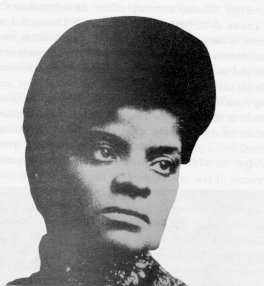 The life
of Ida B. Wells covers several epochs of the African American saga. Born
six months before the signing of the Emancipation Proclamation and reared
during Reconstruction, she came of age during the post-Reconstruction period
and spent her adult life fighting to redress the inequities brought about
by Jim Crow. One of the first African- American women to serve as an investigative
reporter, Wells began her fight at the age of twenty-two when she brought
legal action against the Chesapeake, Ohio, and Southwestern Railroad Company.
Through written and spoken communication she made known the stark atrocities
of lynching in America and conveyed her struggles against all the acts
of inhumanity to the African American in her travels abroad.
The life
of Ida B. Wells covers several epochs of the African American saga. Born
six months before the signing of the Emancipation Proclamation and reared
during Reconstruction, she came of age during the post-Reconstruction period
and spent her adult life fighting to redress the inequities brought about
by Jim Crow. One of the first African- American women to serve as an investigative
reporter, Wells began her fight at the age of twenty-two when she brought
legal action against the Chesapeake, Ohio, and Southwestern Railroad Company.
Through written and spoken communication she made known the stark atrocities
of lynching in America and conveyed her struggles against all the acts
of inhumanity to the African American in her travels abroad.
Ida Wells was born a slave on July 16, 1862, in Holly Springs, Mississippi, to James and Elizabeth (Warrenton) Wells. The oldest in a family of four boys and four girls, she acquired from her parents a love of liberty and self-su~ciency that characterized her life. She attended Shaw University (later Rust College) in Holly Springs, and, after her move to Memphis, Tennessee, she attended summer sessions at Nashville's Fisk University.
The yellow fever epidemic of 1878 claimed the lives of Ida's parents and youngest brother. Following their deaths, Ida, at the age of sixteen, assumed the responsibility of rearing her siblings. Despite seemingly insurmountable obstacles, she took and passed the Mississippi teachers' exam and taught briefly in Holly Springs.
In the 1880s, Wells moved to Memphis. While preparing for the teachers' exam for the Negro Public schools of Memphis, she taught in Woodstock, Tennessee, outside Memphis. In May of 1884, Wells purchased a first-class ticket on a local Memphis-to-Woodstock line. Taking a seat in the white ladies' coach and refusing to move to the segregated "smoker" car when so instructed by the conductor, Wells was ejected from the train. She subsequently filed suit against the railroad company. In December of 1884, the Memphis circuit court ruled in her favor and awarded her damages. On December 5, 1885, Wells lost her suit when the Tennessee Supreme Court reversed the lower court's decision.
Ida B. Wells taught in the Memphis city schools from 1884 to 91. Using the story of her suit against the railroad and its outcome, Wells contributed to The Living Way, a religious weekly, under the pseudonym, "Iola." She also wrote regularly for the African-American press throughout the country. Elected secretary of the Afro-American Press Association in 1889, Wells became known as the "Princess of the Press." During this same year, she became editor of and partner in the Free Speech and Headlight, a militant journal that served as a voice of the African-American community. Wells's 1891 editorials critical of the Memphis Board of Education and its unequal distribution of the resources allotted to the segregated Negro schools led to her dismissal as a teacher.
The Lynching of three young African-American proprietors of the People's Grocery Store, on March 9, 1891, caused Wells to declare journalistic war on lynching. Because of her prickly penned editorials about the issue of lynching, she was banished from Memphis. Exiled from the South, Wells persisted in her struggle against racial injustice and lynching as a columnist for the New York Age. In addition to investigating and reporting on the execution of blacks without due process of law, she lectured on the subject and made her findings known throughout the Northeast, England, Scotland, and Wales.
Three years after she was expelled from Memphis, on June 27, 1895, Ida B. Wells married attorney Ferdinand L. Barnett, editor and founder of the Chicago Conservator. They had four children: Charles, Herman, Ida, and Alfreda.
Ida B. Wells-Barnett is one of eleven prominent Tennesseans depicted in the official Tennessee bicentennial portrait and one of the founders of the National Association for the Advancement of Colored People (NAACP). On March 25, 1931, in Chicago, at the age of 68, the ever-vocal "crusader for justice" was forever silenced.